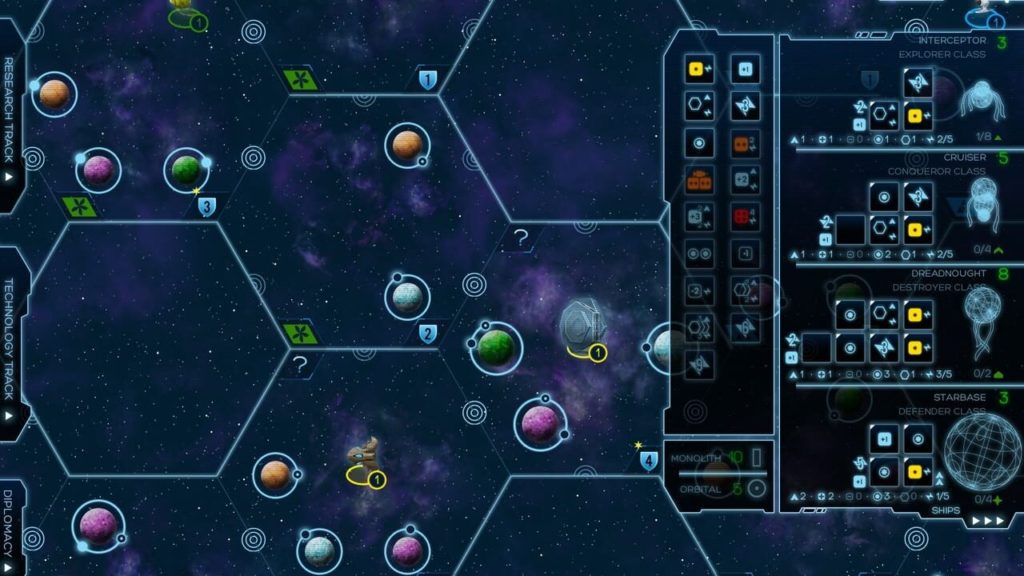For a game that beds itself in a vast sci-fi milieu, it seems awfully banal to remark first on Eclipse’s menus. The impression is unavoidable, though. Even the title screen is beset by them. Dig deeper, and you’ll find menus stacked inside menus stacked inside menus. There are menus for statistics, menus for exploration and menus for modification. All of the game’s substance, its good and its bad, is tucked away in these menus.
Your first step is to learn the function of each menu. Easier said than done. There’s a tutorial but, frankly, it’s not very good. Like a bad French teacher, it imparts the rules but not the exceptions. You might fare better with the handy digital manual, itself several pages in length. The developers seem aware of how overwhelming it might be to a newcomer, because they open this manual by emphasising that there is only one goal – the accumulation of victory points. This is true. How are victory points earned? Through careful manipulation of the menus, of course.
Emerging from the manual full of knowledge, you might feel cocky enough to start a match. The main visual interface here is a honeycomb of hexagons, each representing a section of space. The overall trajectory of the game is expansionist. The accumulation of victory points will mean more exploration, more colonisation, more gathering of resources and materials. These activities must be balanced against a tax, of sorts, incurred for each action. Individual players will develop their own strategy for attaining these goals, of course, with some adopting peaceful exploratory policies based on trade, and others adopting a more aggressive stance based around conquest and treachery.

It’s hard to imagine how a title of this complexity worked as a tabletop game, and tempting to believe that it was always a video game in waiting. Certainly, it fits well onto the iPad, a clean, responsive interface making smooth work of what could otherwise be unwieldy. Aesthetically, the game is functional, which is perhaps for the best – excessive flashiness might obscure one of many important numbers dotting the screen. One notable shortcoming is the music, a tiresome loop indeed. It can be turned off, though, and the game will not interfere with any audio you might wish to play in the background.
A game of this complexity could trip itself up. Thankfully, that’s not the case, and what shines through is a polished, high-quality title. After a few frustrating matches in which events happening on-screen seem to bear little relation to any form of logic, you begin to adapt to its rhythm. Crucially, the menus stop looking like algebraic tables and start brimming with something else: potential. Perhaps it helps if you go in thinking of it not as an intricate board game, but a finely-honed sandbox game. There’s a lot of content here, and plenty of room for variation and experimentation in how matches are set up. Against the computer, you can vary not only the number of bots you play against, but their individual difficulty levels. The space factions, assigned to the player and their opponents, each have their own strengths and weaknesses, and multiplayer (local and online) adds yet another layer of value.
It’s telling that the only significant criticism that can be levelled at Eclipse is the double-edged sword of its complexity. It may be superficial to discuss prices, but it’s a necessary superficiality in this case, because inside that relatively high price tag is the question of how much time and effort you’re willing to pour into a game to get something out of it. Sceptics will have their own reasons for shaking their heads and walking away, but those who make the investment will find a rewarding experience, with oodles of depth, hours of playtime and, yes, an abundance of menus.